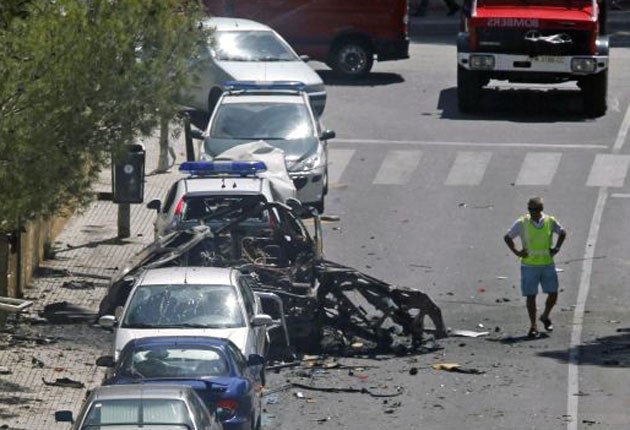Majorca rocked as Eta takes its fight to holiday isle
Two policemen killed on second day of attacks by Basque separatists

A second bomb in two days attributed to the Basque separatist group Eta rocked the popular holiday destination of Majorca yesterday, killing two policemen after it detonated in one of the island's main tourist resorts.
Spain remained on high alert last night for more blasts coinciding with the organisation's 50th anniversary, after police found another bomb attached to a civil guard vehicle close to where the two guards were killed in the afternoon. Bomb squad specialists were de-activating the device, which had been primed for detonation by remote control. Intelligence reports had already suggested that at least three bombs had been prepared in France for detonation in Spain.
Holidaymakers faced travel chaos as the police immediately enacted "Operation Jaula", or "Cage", to put the island into lockdown. They sealed off the airport for several hours as well as all ports. Roadblocks were put in place and tourists were prevented from leaving their hotels. The capital Palma was beset with massive traffic jams and passengers for ferries and outward flights were subjected to additional security checks.
The government representative in Majorca, Ramón Socias, condemned Eta as "a bunch of crazy murderers". "They're getting ever more desperate and more dangerous," he said.
Meanwhile, the attack prompted the British Foreign Office to issue a new warning to travellers that Spain was subject to "a high threat of terrorism". "Attacks could be indiscriminate," it said, "including in places frequented by expatriates and foreign travellers."
The bomb, probably a type of limpet mine activated by motion or remote control, exploded underneath the guards' Nissan Patrol vehicle near their barracks in Palmanova, adjacent to Magaluf in the south-west of the Balearic island. It went off just before 2pm in front of the three-star Hotel Sol Mirlos Tordos, just 500 metres from the beach which was packed with holidaymakers, many of them British. There were an estimated 15-20,000 holidaymakers from the UK on the island yesterday, according to the British travel agents organisation ABTA.
The two men killed were named by last night as Diego Salva Lezaun and Carlos Sáenz de Tejada Garcia. Both men were members of the paramilitary Civil Guard, which polices rural areas and guards official buildings. They were aged 27 and 28.
One of them was said to be from the northern town of Burgos, where another bomb blamed on Eta exploded on Wednesday, injuring 60. "Luckily no one else was injured in the explosion," said Mr Sacias. "The bomb appears to have been operated by remote control."
Wednesday's attack hit a police barracks and injured 60 people. The two incidents come shortly before today's 50th anniversary of the foundation of Eta, which has been relatively quiet in recent years, and may be intended to contradict the Spanish government's assertion that its powers are on the wane.
Yesterday's bombing was the ninth attack by Eta this year, and the first fatal attack it has ever carried out on Majorca.
The terrorist organisation seeks independence for the Basque Country in northern Spain as well as adjoining areas in Navarre and south-west France. It has killed 856 people since its formation. It is designated a terrorist group by Spain, the European Union and the United States. Surveys show the majority of Basques do not want independence from Spain.
The prime minister, José Luis Rodriguez Zapatero, the interior minister Alfredo Perez Rubalcaba, and the opposition leader, Mariano Rajoy, were making plans to fly to the island last night.
In the past Eta has targeted tourist resorts and beaches with summer bombing campaigns on the Spanish costas in a bid to get maximum publicity for their cause. But they have usually telephoned warnings before bombs have exploded, an action they did not take before Wednesday's explosion in Burgos.
The attacks also come shortly before King Juan Carlos and Queen Sofia start their annual holiday with their family in Majorca's Marivent Palace, just a few miles from the bombing. In 1995, police foiled a plot by Eta to shoot the Spanish king with a sniper as he was boarding the royal yacht, Fortuna. Details of another plot by Eta to kill the king were found on a CD at an Eta hideout in France in 2004. That involved using a surface-to-air missile to shoot down a helicopter or plane carrying the monarch.
Join our commenting forum
Join thought-provoking conversations, follow other Independent readers and see their replies
Comments